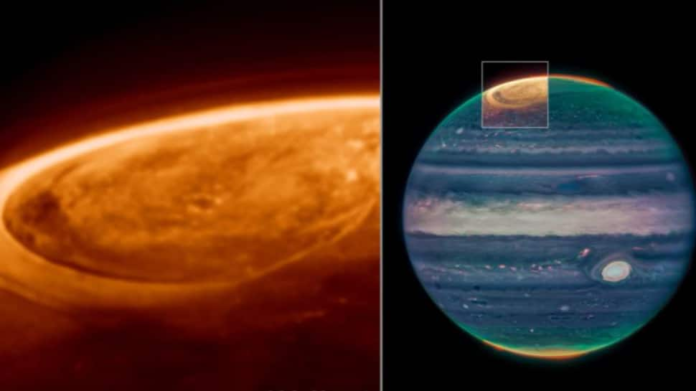In a breathtaking new discovery, NASA has unveiled spectacular footage of enormous auroras raging across Jupiter—so massive that they could easily engulf Earth. Captured by the James Webb Space Telescope (JWST), these intense light displays provide a stunning glimpse into the dynamic and violent interactions happening high in the gas giant’s atmosphere.
The recent research in Nature Communications, marks a pivotal advancement in our understanding of how Jupiter’s upper atmosphere is heated and cooled, factors that have long puzzled scientists.
A Light Show Beyond Imagination
Auroras on Earth are awe-inspiring enough, created when solar storms send charged particles crashing into our planet’s magnetic field. But Jupiter takes it to a whole new level. The auroras captured by Webb are hundreds of times brighter than any seen on Earth, thanks to Jupiter’s colossal magnetic field—the strongest of any planet in our Solar System.
Jupiter’s auroras are powered not only by the solar wind but also by charged particles hurled into space by Io, the planet’s volcanic moon. This moon’s continuous volcanic eruptions fill Jupiter’s magnetosphere with particles, creating a complex and highly energetic environment.
Webb and Hubble Join Forces
The team, led by Jonathan Nichols from the University of Leicester, used the Webb Telescope to record fast-changing auroral patterns. Contrary to expectations, the auroras didn’t glow steadily or fade slowly. Instead, they “fizzed and popped with light,” changing intensity in mere seconds, almost like cosmic fireworks exploding in real time.
“What a Christmas present it was – it just blew me away!” said Nichols. “We thought these lights would fade gradually over 15 minutes or more. But instead, the entire auroral region was pulsating rapidly, with variations occurring in seconds.”
To enhance their observations, researchers also utilised the Hubble Space Telescope, which simultaneously imaged Jupiter. Interestingly, this double-vision approach brought more questions than answers.
A Cosmic Puzzle Still Unsolved
According to Nichols, one of the brightest emissions seen by Webb had no corresponding glow in Hubble’s view. “It’s bizarre,” he said. “The brightness captured by Webb suggests an influx of extremely low-energy particles. But combining that level of energy with such high quantities was thought to be impossible.”
This mysterious mismatch between the two telescopes’ data has opened a new chapter in the study of Jupiter’s upper atmosphere and magnetosphere. The team now plans to further investigate this puzzling discrepancy, hoping to unlock new secrets about how Jupiter’s space environment works—and how it’s so drastically different from Earth’s.
Watch auroras rage on Jupiter:
As scientists continue to dive deeper into the giant planet’s auroras, one thing is clear: Jupiter’s storms are not just bigger than ours—they’re utterly alien.
